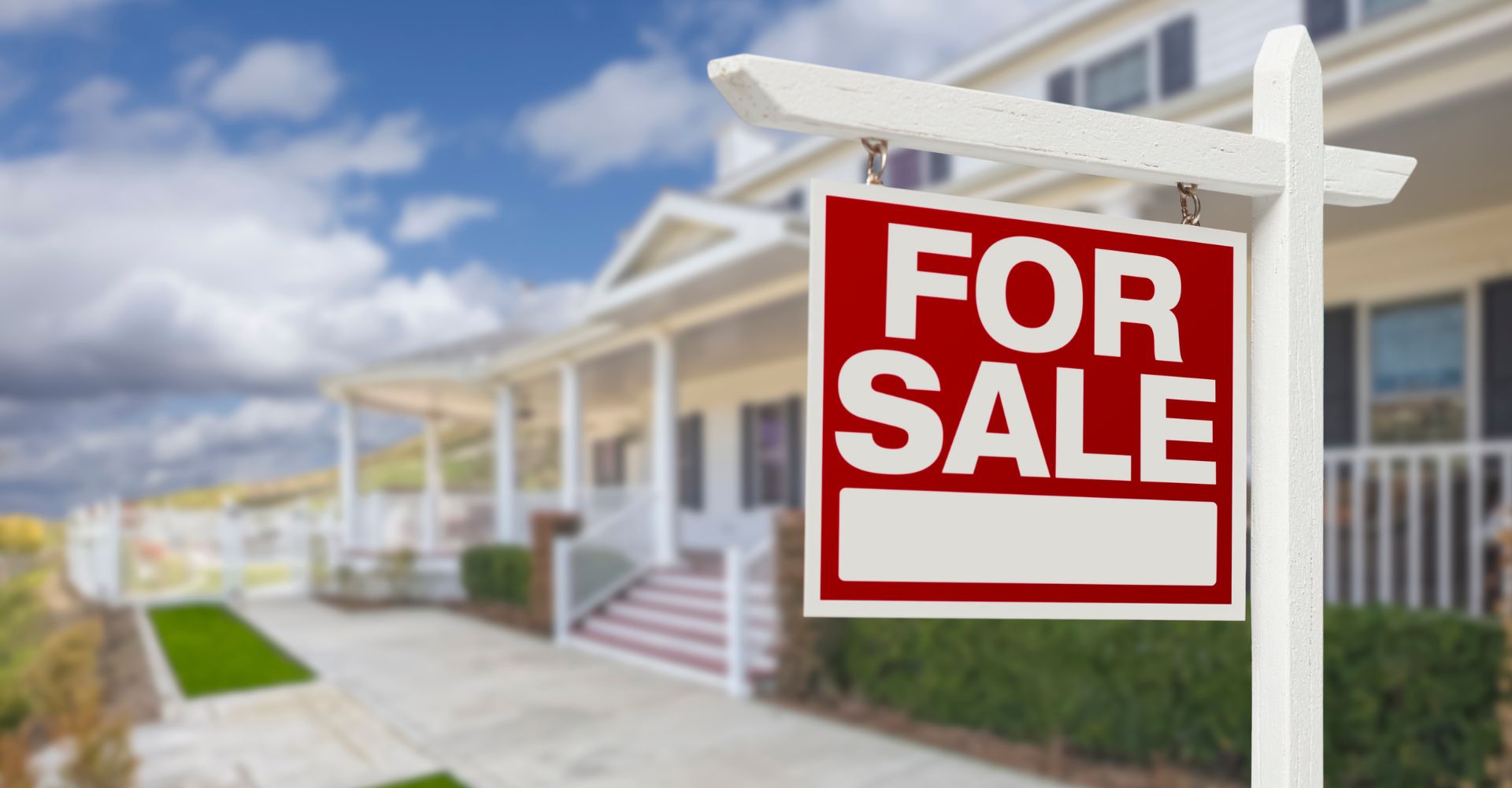Is your home not selling?
Don’t worry!
We understand how frustrating it can be when you’re not attracting genuine buyers and instead dealing with low offers from house flippers.
Selling a home is a significant transaction, and it’s easy to overlook certain factors that might be discouraging potential buyers.
Most if not all real estate agents are familiar with some variation of this home seller question: “Why is my home not selling?”
But fear not!
We’re here to help you get to the bottom of it.
We’ve compiled a list of common reasons why a home isn’t selling, along with practical solutions to help you fix them.
Let’s find out what’s going on and get your home sold!

1. Asking Price is Too High
Make the most of buyer interest in your home by starting with the right price from the beginning. Although you may adore your home and have invested time and money into renovations, if it’s not attracting any attention, it’s likely listed too high. It’s important to understand what factors influence home value. Overpricing can result in potential buyers simply moving on to the next listing without even considering yours.
To establish the optimal asking price for your home, rely on your agent to conduct a thorough comparative market analysis (CMA) and guide you through it. By comparing your home’s price with that of similar properties in the area, a realistic price can be determined. While it’s tempting to think your home is worth more, it’s important not to let sentimentality cloud your judgment. Ultimately, what your home is worth is whatever a buyer is willing to pay for it.
What To Do:
Want to sell your home quickly? Price it right from the start! When you set an attractive price, you’ll generate more interest, which could actually drive up the final selling price. But if your home is already listed, don’t worry. Sit down with your real estate agent to discuss the best approach for lowering the price and finding the sweet spot that will bring in the most potential buyers. Together, you’ll set the stage for a successful sale.
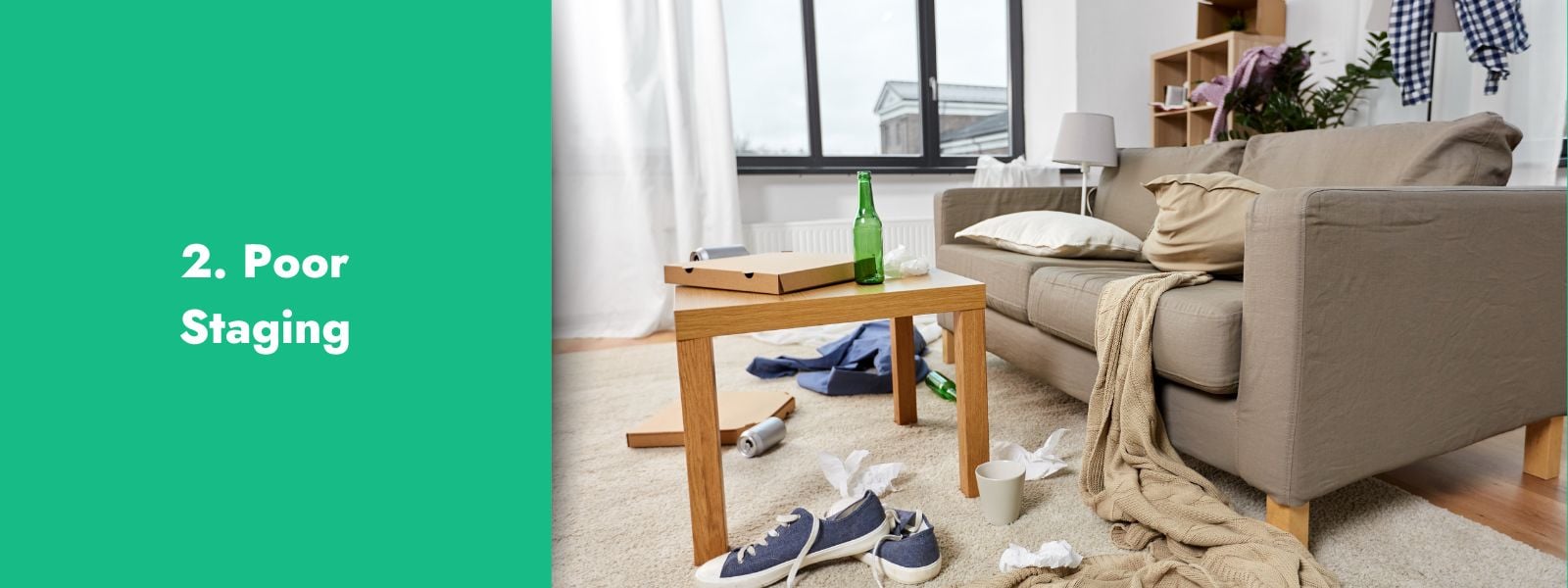
2. Poor Staging
Want to sell your home faster and for a better price? It’s time to consider home staging!
Home staging is the process of rearranging and decorating your home to make it more appealing to potential buyers. Not staging your home is a common home-selling mistake. When done poorly, it can deter buyers and make it harder to sell your house. But when done right, home staging can have a big impact on buyers’ perception of your home.
Did you know that 40% of buyer’s agents believe that staging has a positive effect on most buyers? And more than half of all seller’s agents agree that staging helps homes sell faster! So why is staging so effective? It helps buyers envision themselves living in the space, making it more inviting and desirable.
Take a moment to evaluate your home. Have you put effort into staging key areas like the living room, kitchen, yard, and landscaping? If not, consider asking your agent for tips on how to make your home more attractive to potential buyers. Don’t miss out on the benefits of home staging – start today and increase your chances of a successful sale!
What To Do:
Want to stage your home for potential buyers but don’t want to break the bank? We’ve got you covered! The first step in preparing your house to sell is to declutter and remove any excess decor – a simple and cost-free way to enhance the appeal of your home.
Follow our seller home cleaning tips to give your home a deep clean to make it look cared for and inviting. Then, consider removing any furniture or decor that feels crowded, oversized, dark, or dated. This will make your space feel brighter and more spacious, helping buyers envision themselves living there.
Don’t forget to take down personal items to allow potential buyers to visualize themselves in the space. With these easy and budget-friendly steps, you’ll be ready to impress potential buyers and sell your home in no time!

3. Low-Quality Photos
Professional real estate photography is no longer a luxury, but a necessity. In today’s competitive market, it has become the standard expectation for sellers. Set yourself apart from the rest by ensuring your listing stands out with high-quality, captivating photos.
Don’t underestimate the power of a photo. In fact, it can make or break the sale of your home. With 93% of buyers going online during their home search, your listing photos are the first impression they have of your property. Make sure you leave a lasting impression by showcasing clear, bright, and visually appealing images.
Buyers typically spend only a few seconds skimming through listing photos before deciding whether to explore further. The lack of photos, poor-quality images, or cluttered spaces reflected in the photos can easily turn potential buyers away, causing them to move on to the next listing.
The National Association of Realtors’ 2021 Generational report found nine in ten buyers ranked professional listing photos as the most valuable website feature in their home search. Don’t let low-quality photos hinder the sale of your home. Invest in professional real estate photography to present your property in the best light possible.
What To Do:
Make your home shine with professional staging and photography. Don’t underestimate the power of stunning visuals. According to IMOTO, property listings featuring high dynamic range (HDR) photos sell 50% faster and increase online views by 118%. Homes with drone photos or aerial photos sell 68% faster. And the best part? Hiring a pro won’t break the bank – usually just a couple hundred bucks. Let the experts capture your home in its best light and watch your investment pay off.

4. Bad Marketing Strategy
Simply sticking a sign on the lawn won’t guarantee success in selling your home. That’s where a good listing agent comes in. They have a range of marketing strategies to attract more potential buyers, such as leveraging social media and their own blog.
But it doesn’t stop there. Agents with strong professional networks have connections with buyer’s agents in your area. They can actively reach out to them and find out if they have any clients looking for a home like yours. No need to wait for someone to call the number on your sign.
In fact, it’s even helpful to ask for recommendations from trusted sources like family members or coworkers who had positive experiences with a specific real estate agent.
What To Do:
Want to make sure your home is getting the attention it deserves? Have a chat with your listing agent to discuss any concerns you have about the marketing. There may be additional strategies they can employ to promote your listing effectively.
If you’re selling your home without an agent, there’s still plenty you can do. Consider sharing your listing on local social media sales pages to reach a wider audience. The more people see your listing, the higher the chances of finding a potential buyer.
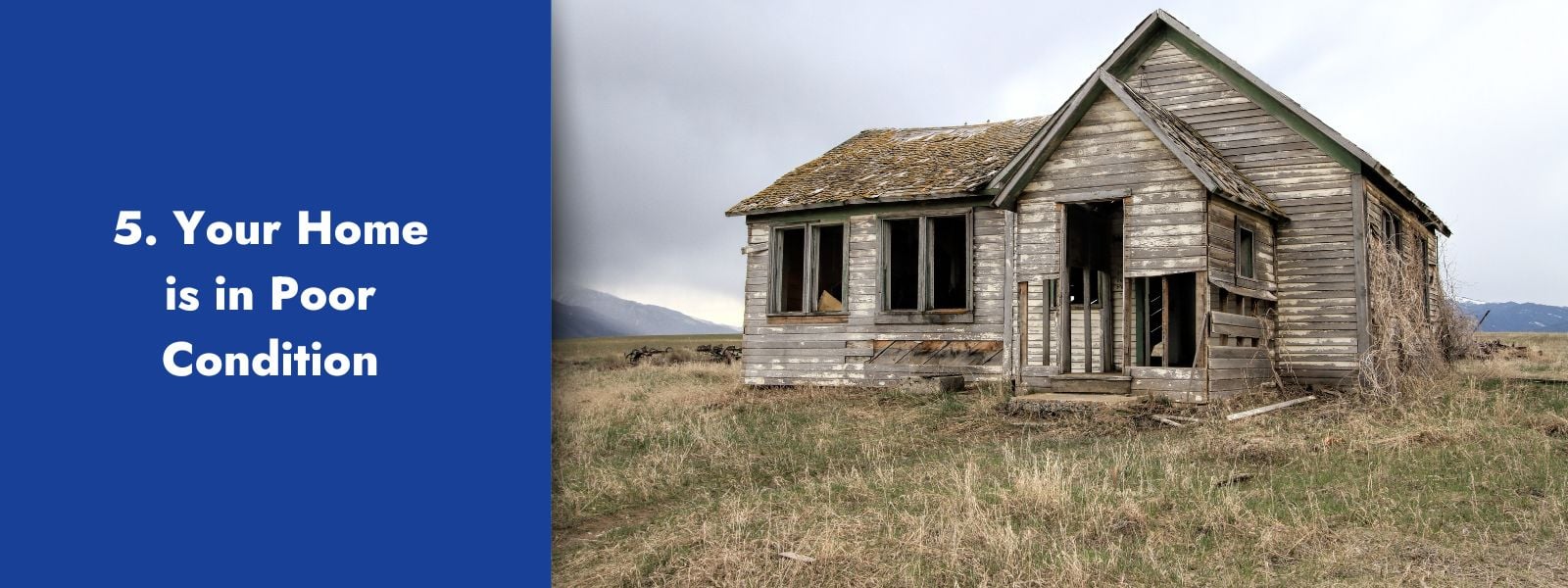
5. Your Home is in Poor Condition
If your home isn’t selling, you may be wondering what the issue is. While it could be anything from poor marketing to an unrealistic asking price, one major factor could be the condition of your home. Buyers want a home that they can picture themselves living in and feel proud to call their own, which can be difficult to do if the home is in poor condition.
From outdated features to structural issues, potential buyers can be turned off by anything that seems like it would require significant work and expense to address. If you’re struggling to sell your home, it may be worth considering investing in some upgrades or repairs to make it more attractive to potential buyers. Perhaps equally important is what NOT to fix when selling a house. You don’t want to waste time or money on repairs or improvements that aren’t important to buyers.
What To Do:
Transforming your home’s appearance doesn’t have to be complicated. Even small changes can have a big impact. By reorganizing and decluttering, you can instantly make your space more appealing to potential buyers. Take a close look at anything that looks outdated, dirty, or in need of repair. Getting rid of these eyesores will help buyers see themselves in your home.
However, if there are bigger issues with your home’s condition that require significant repairs or renovations, things can become more challenging. Not everyone is interested in buying a fixer-upper, so you may have to roll your sleeves up and get to work. If fixing these issues isn’t feasible for you, the key is to be realistic about your asking price and approach negotiations with the right mindset.

6. Inexperienced Real Estate Agent
Are you struggling to sell your home? It could be because you’re not working with a real estate agent. Selling a valuable property requires the expertise of someone who lives and breathes real estate. By partnering with an agent, you’ll have access to the Multiple Listing Service (MLS), a private online database managed by professionals in the industry. This means more serious buyers will have the opportunity to see your home.
On the other hand, if you are already working with an agent but still aren’t seeing results, it might be a red flag. It could indicate that you have a less-than-ideal agent. Consider this: if your agent hasn’t been successfully selling homes for at least four years and struggles to sell more than 12 homes per year in an average market, it might be time to reevaluate who you’re entrusting with your commission check.
What To Do:
It’s essential to work with a knowledgeable agent who specializes in your area or the type of home you’re selling. While advice from well-meaning friends or relatives from afar can sound promising, it can also be a risky choice. It’s crucial to have an agent who understands your neighborhood, how to price your home accurately, and effectively highlight its features.
Choosing the wrong agent could mean selling your home for less or spending additional time on the market. The right agent will help you to maximize your home selling profits. When searching for a reliable agent, consider interviewing multiple candidates to find the best fit. Don’t forget to request past client testimonials or recommendations to ensure their track record.
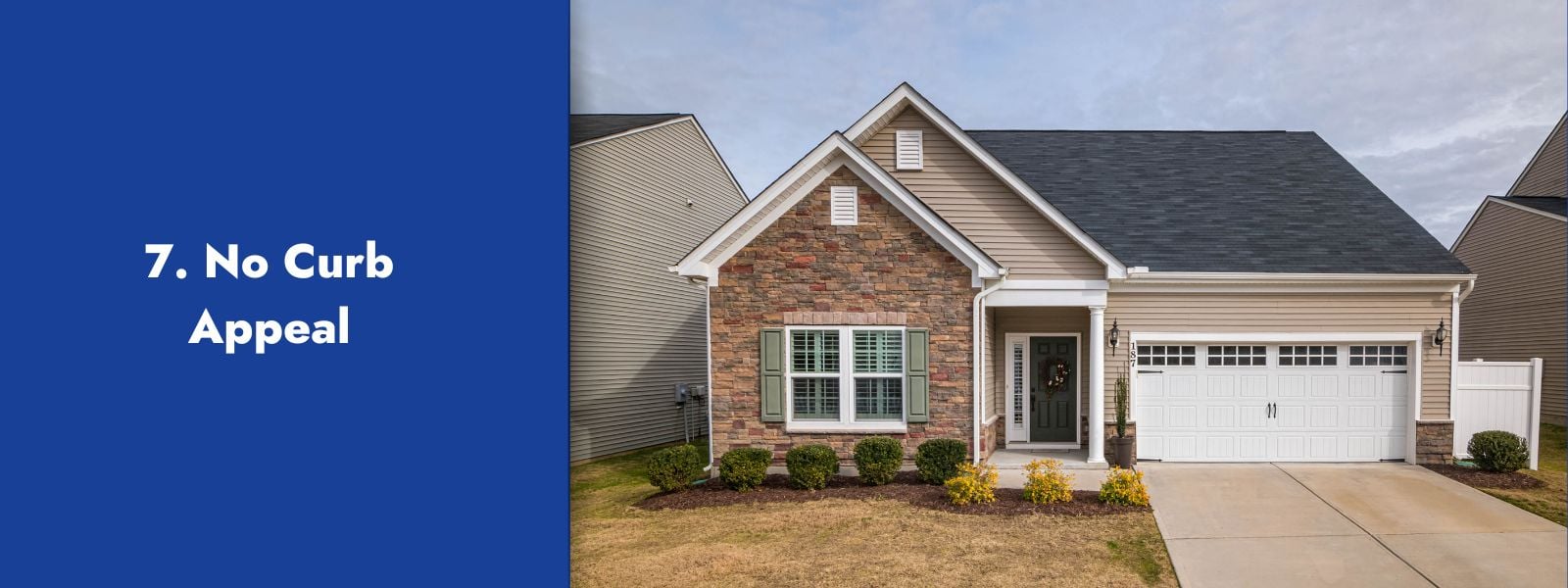
7. No Curb Appeal
Make a great first impression on potential buyers by improving your home’s curb appeal. The way your home looks from the outside can greatly influence whether or not people even want to step inside. Don’t let a lackluster exterior hold you back from selling your house.
Simple fixes like fresh paint, power washing, landscaping, and flowers can make a big difference and even add value to your home. In fact, the National Association of Realtors (NAR) found that 92% of Realtors recommend enhancing curb appeal before selling a home. Don’t underestimate the impact of a beautiful exterior – it could mean thousands of dollars in your pocket.
What To Do:
Transform your yard into an envy-inducing paradise with minimal effort or cost. Whether you’re DIY-ing or hiring a pro, upgrading your landscaping, achieving lush green grass, adding vibrant flowers, and repairing any weathered parts of your home’s exterior is totally achievable.
Check out the homes in your neighborhood that catch your eye and take note of their winning features. From trimming bushes to a fresh coat of paint on the front door, even small updates can do wonders for your curb appeal and make your home a magnet for buyers.
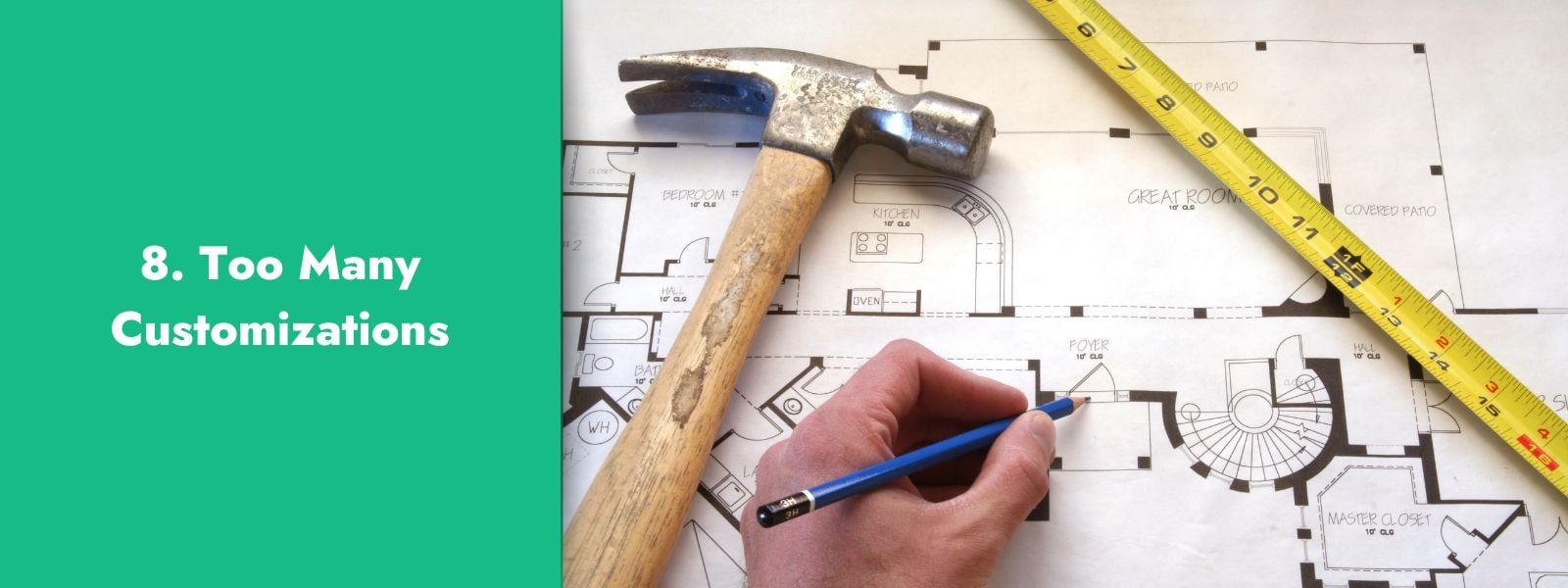
8. Too Customized or Unconventional
Not every home improvement will increase a home’s value. There are some that will do just the opposite. While it’s tempting to invest a substantial amount of money into renovations and set a higher price tag, it’s important to consider whether these enhancements truly provide a return on investment.
Let’s take swimming pools, for instance; they’re costly to install and don’t always result in a proportional increase in home value. In fact, some potential buyers may actively steer clear of homes with pools.
Moreover, certain home improvements can actually detract from a house’s appeal. For example, transforming rooms into highly specific spaces that may not resonate with most buyers can make your home less attractive. Converting a bedroom into a walk-in closet may seem convenient for your shoe collection, but it may pose a challenge for the next buyer who needs a bedroom for their child. Consider the long-term implications before personalizing your home in ways that may limit its marketability.
What To Do:
When renovating your home, it’s important to consider whether it’s worth investing more money into making major changes. We compiled a list of the top 15 upgrades to sell your home faster and for more money. If you can update it quickly and affordably, it’s worth considering. However, if not, you may need to be realistic about the sales price and not expect to recoup your full renovation costs.
If your home is unique or unconventional, it may take some time to find the right buyer. Think about what attracted you to the home in the first place – there are likely other buyers out there who will have the same appreciation.
To attract these buyers, make sure your marketing and advertising strategy highlights the distinctive features of your property in a positive way. Get the information in front of the right people by utilizing online real estate sites, Facebook groups, specialty websites, mailing lists, local apps like Nextdoor, or even print publications that cater to your target audience.

9. You’re Unwilling to Negotiate
If you’ve been struggling to sell your home despite your best efforts, it might be time to consider your negotiation tactics. Being unwilling to negotiate with buyers can be a major roadblock in the home-selling process.
When potential buyers are shopping for a new home, they want to feel like they’re getting a good deal. If you’re unwilling to budge on your asking price or other terms, buyers may look elsewhere. However, negotiating doesn’t have to mean settling for less than what you think your home is worth.
What To Do:
When it comes to negotiation, having a trustworthy real estate agent is crucial. They can guide you through market expectations and help you prepare for what to negotiate, even before receiving any offers on the home.
Negotiations are about finding a compromise that works for both parties. By being open to negotiation, you’ll not only increase your chances of selling your home, but you may also end up with a better deal than you originally thought possible.

10. It’s a Buyer’s Market
Real estate markets swing between seller’s markets and buyer’s markets depending on the greater economy and local real estate conditions. The ebb and flow of market conditions can greatly impact your success as a seller.
If your home has been on the market for a while without attracting any offers, it can be frustrating and worrisome. One possible reason why your home isn’t selling could be because you’re in a buyer’s market. This means that there are more homes for sale than there are buyers, which gives buyers more bargaining power and makes it harder for sellers to get the price they want.
While a buyer’s market may not be the best time to sell, it doesn’t mean that you should give up hope. With the right strategies, pricing, and marketing, you can still find a buyer willing to pay what your home is worth, even in a challenging market.
What To Do:
Sell your home when the market is in your favor for the best outcome. However, sometimes you don’t have a choice and need to sell regardless of the economic conditions. In those situations, be prepared for fewer buyers who may take their time and expect a better deal. Set your price accordingly and be open to negotiation.
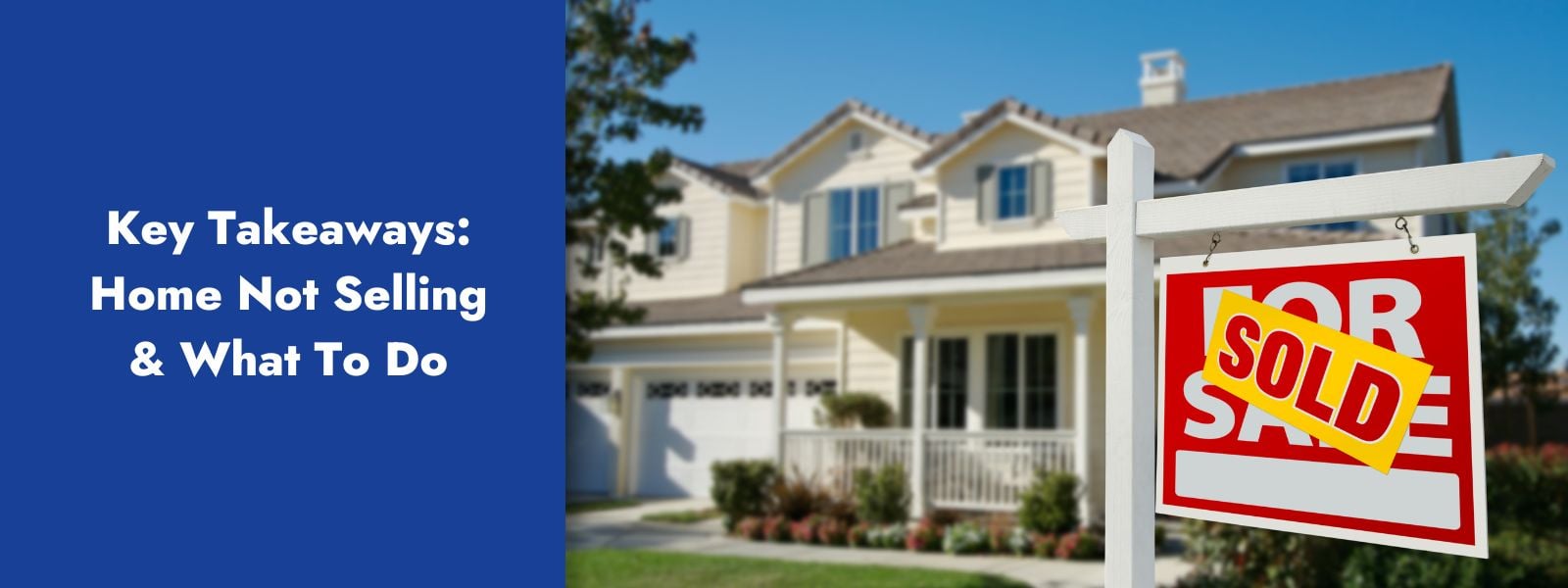
Key Takeaways From Why Your Home Isn’t Selling & What To Do About It
Selling your home is a stressful time and it’s understandable that want to sell it as quickly as possible.
But what if your home isn’t selling?
Take a step back to evaluate and assess the situation.
Once you’ve identified a likely culprit, make the necessary adjustments to help it sell quickly moving forward.
When you are ready to list your home, give us a call at (817) 923-7321 or contact us.
Helen Painter Group Realtors is here to offer our knowledge and expertise to help facilitate your home-buying journey.
A long-standing and trusted Fort Worth real estate agency, we’ve been serving buyers and sellers since 1958.
With over six decades of success behind us, you’ll surely have peace of mind knowing your best interests are being represented throughout the home-selling process.

FAQs
Here are a few frequently asked questions about why a home isn’t selling.
When should I worry about a house not selling?
When it comes to selling your house, it’s natural to feel a bit anxious if you find that your home isn’t moving as quickly as you’d like. While it’s normal for houses to sit on the market for a while, it’s important to pay attention to certain signs that your house might not be getting the attention it deserves. For example, if you’ve had few to no showings in a week or more, or if you’ve already lowered your asking price without success, it may be time to reassess your selling strategy.
However, before you get too worried, remember that the housing market can be unpredictable and there are a variety of factors that can impact the home selling timeline. By consulting with a trusted real estate agent and staying patient, you’ll be able to determine the best course of action when it comes to getting your house sold.
What makes a house harder to sell?
Selling a house can be a daunting task, especially if your property has been lingering on the market for a long time. There could be various reasons for your house being harder to sell. Sometimes, it could be due to the location of the property, or perhaps the size and layout of the house don’t match the preferences of potential buyers.
Other reasons could be related to the general condition of the property, such as outdated fixtures or the need for major repairs. Buyers may also be concerned about the environmental factors surrounding the house, such as noise pollution or safety concerns. Regardless of the reason, understanding what makes a house harder to sell is crucial in determining the right course of action to get it off the market and into the hands of a new owner.
Is it common for home sales to fall through?
Buying or selling a home can be a long and complicated process, and naturally, you want it to go smoothly. Unfortunately, that’s not always the case. Home sales can fall through for a variety of reasons, such as financing issues, home inspection problems, or even a change of heart by one or both parties involved.
While this can be frustrating and disappointing, it’s not uncommon in the real estate world. In fact, data from the National Association of Realtors shows that 5 percent of contracts were terminated in the final quarter of 2022, and 15 percent were delayed. The good news is that with the help of a knowledgeable real estate agent, you can minimize the chances of a home sale falling through and increase the likelihood of a successful transaction.

